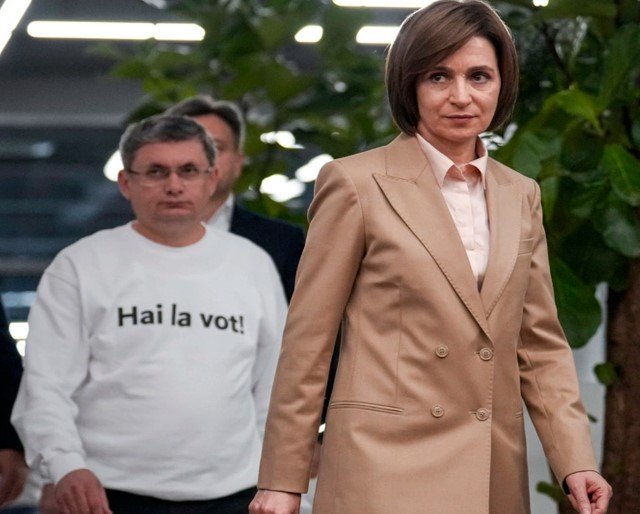In a highly consequential election viewed by many as a symbolic choice between aligning with Europe or returning to Moscow’s influence, Moldova’s pro-European Union President Maia Sandu has won a second term, securing a solid lead in the polls with 55% of the vote. The victory represents a continuation of Sandu’s agenda, pushing Moldova toward stronger ties with the EU and away from Russia’s orbit. The election, marked by international attention and claims of external interference, could have lasting implications for Moldova’s geopolitical orientation.
In a late-night speech following her victory, Sandu promised to be a “president for all Moldovans,” addressing a divided electorate. Her rival, Alexandr Stoianoglo, a former prosecutor general backed by the pro-Russian Party of Socialists, campaigned on a platform favoring closer ties with Moscow, despite his denial of any pro-Kremlin alignment. The tense runoff served as a focal point in the region’s tug-of-war between East and West, with Moldova’s future direction hanging in the balance.
Russian Interference Allegations Surface as Election Tensions Rise
As Moldovans cast their votes, Sandu’s national security adviser made a striking announcement, alleging “massive interference” from Russia in the electoral process. He warned that such interference had a “high potential to distort the outcome,” though he did not provide detailed evidence to back the claims. Russia, however, swiftly denied these allegations, rejecting any involvement in Moldova’s election.
The accusations of Russian meddling are not new for Moldova. The small Eastern European country has frequently found itself at the center of broader geopolitical disputes, with Russia’s influence historically playing a significant role in its political landscape. Moscow’s alleged attempts to sway outcomes in Moldova’s elections underscore the stakes of this year’s vote, as Sandu seeks to steer the nation closer to the EU’s sphere, despite regional pressures and Moscow’s persistent interest in maintaining influence over former Soviet states.
The interference claims have only deepened the polarization within Moldova, with Sandu’s supporters viewing the election as a stand against foreign influence, while Stoianoglo’s base remains skeptical of the government’s EU-focused policies.

Alexandr Stoianoglo: The Pro-Russia Candidate Denies Kremlin Connections
Stoianoglo, a former prosecutor general dismissed by Sandu, emerged as a central opposition figure, rallying Moldova’s pro-Russian electorate with promises of restoring ties with Moscow. Though backed by the pro-Russian Party of Socialists, Stoianoglo has repeatedly rejected the label of a “pro-Kremlin” candidate, asserting that his platform seeks a pragmatic relationship with Russia rather than subservience.
Stoianoglo’s calls for closer cooperation with Moscow appealed to Moldova’s sizable Russian-speaking minority, which harbors concerns about Moldova’s EU-leaning trajectory. His emphasis on economic ties with Russia and maintaining neutrality reflects a broader sentiment in Moldova that questions the rapid embrace of Western policies.
Despite his defeat, Stoianoglo’s support reflects a persistent divide within Moldova, highlighting the challenges Sandu faces in uniting the country under a cohesive direction. While Sandu’s push for EU integration has garnered international praise, it has also stirred opposition from citizens wary of the economic and cultural shifts that closer ties with Europe may bring.
Maia Sandu’s Vision for Moldova’s Future
Maia Sandu, known for her resolute stance on corruption and commitment to EU alignment, has been a transformative figure in Moldova’s politics since she first took office. Her approach seeks to modernize Moldova, strengthen democratic institutions, and bring the country closer to European standards. Sandu’s re-election represents a mandate to continue these reforms, though the divided election underscores the challenges ahead.
Sandu’s commitment to EU integration aligns Moldova with the path taken by other Eastern European countries, such as Romania and Ukraine, which have sought distance from Moscow’s influence. For Sandu, European integration is not only a political aim but also an economic strategy aimed at improving Moldova’s economic resilience, creating jobs, and curbing emigration by aligning Moldova’s standards with those of the EU.
However, her victory does not resolve the tension within Moldova’s political landscape. As she embarks on her second term, Sandu will need to navigate the fine line between reform and unity, bridging the gap between her pro-EU supporters and those who favor a balanced relationship with Russia.
The International Stakes of Moldova’s Election
This election, seen as a litmus test for Moldova’s geopolitical leanings, has captured the attention of both the EU and Russia, each seeking to secure Moldova as an ally. For the EU, Sandu’s re-election reinforces a pro-European shift in Moldova, potentially accelerating the country’s accession talks. Meanwhile, Moscow is likely to monitor Moldova’s moves closely, as Sandu’s second term could bring about policies that weaken Russia’s long-standing influence in the region.
With the international spotlight on Moldova, Sandu’s administration is expected to prioritize issues that resonate on the global stage, such as anti-corruption measures, energy independence, and improved regional stability. This trajectory aligns Moldova with the EU’s broader objectives in Eastern Europe, offering the bloc a partner in countering Russian influence.
Sandu’s second term, however, may not be free of challenges. Moldova’s economic struggles, reliance on energy imports, and complex demographics make it vulnerable to both internal and external pressures. How Sandu addresses these issues while advancing Moldova’s pro-European agenda will determine the nation’s path forward.
